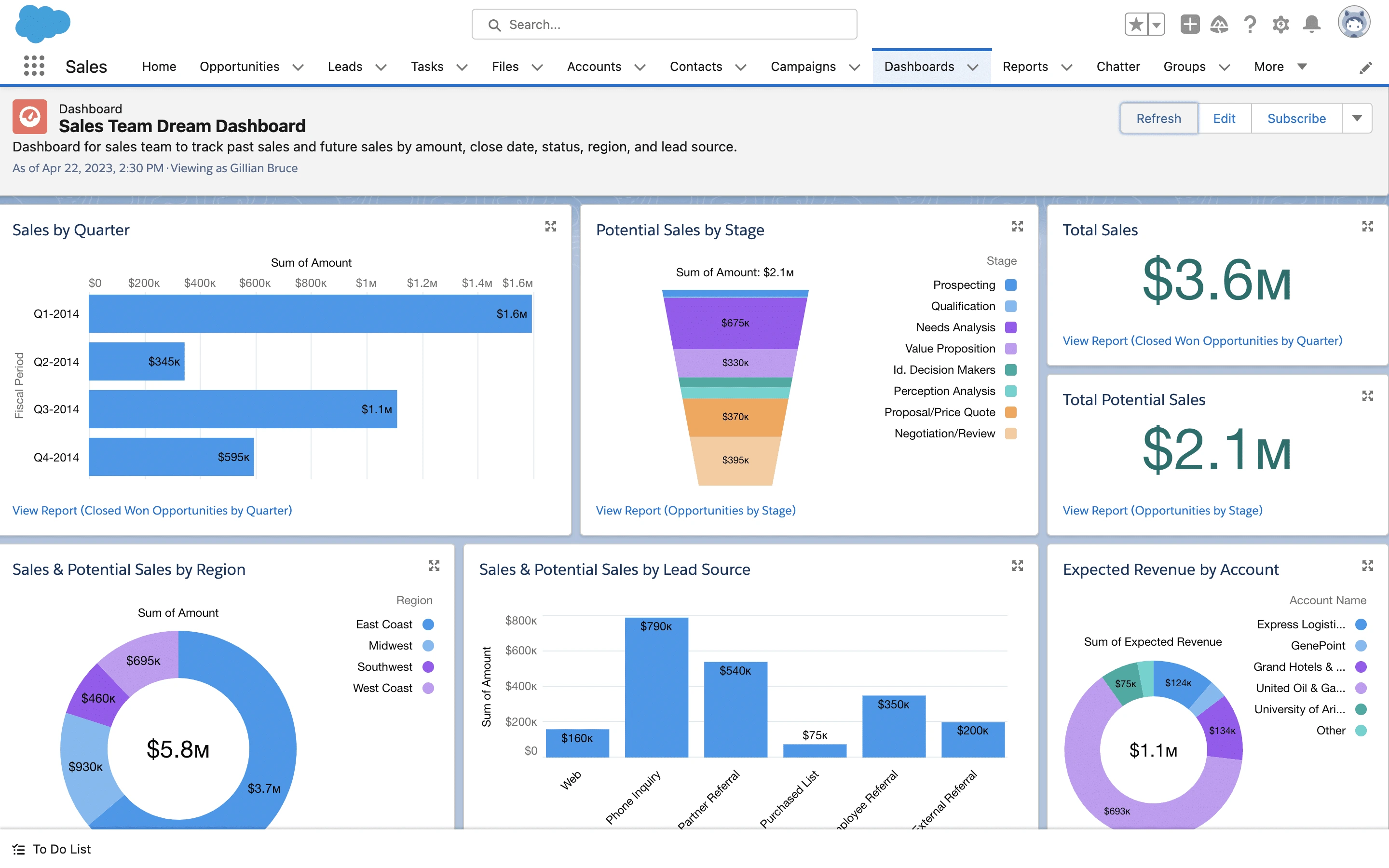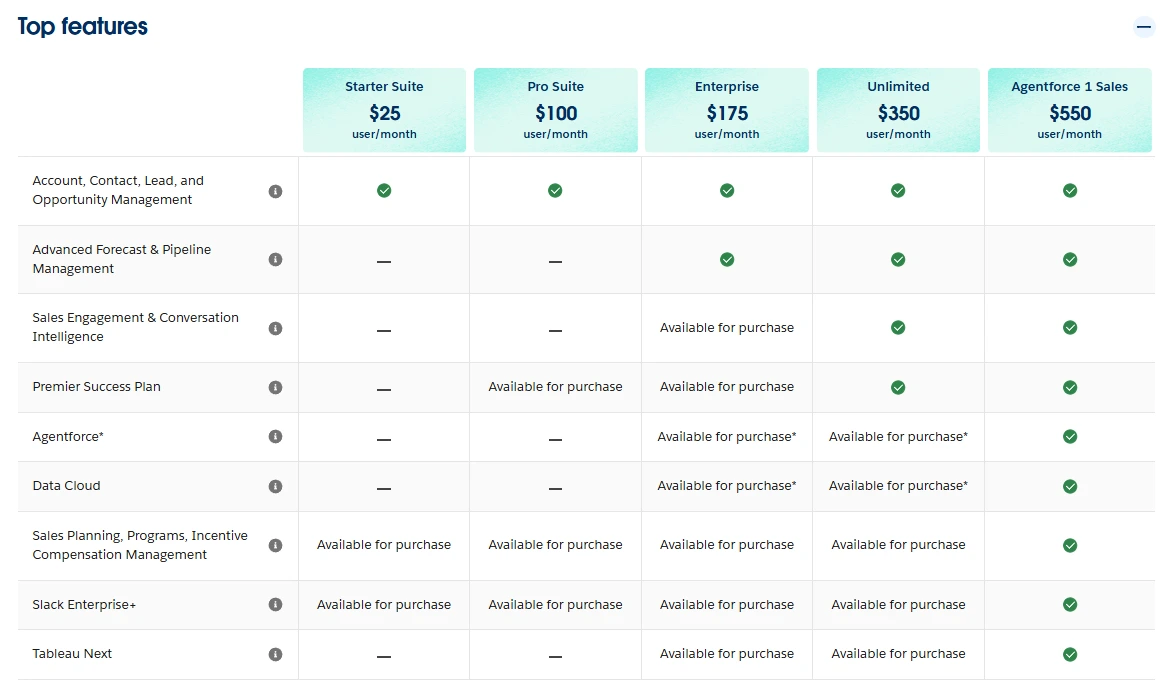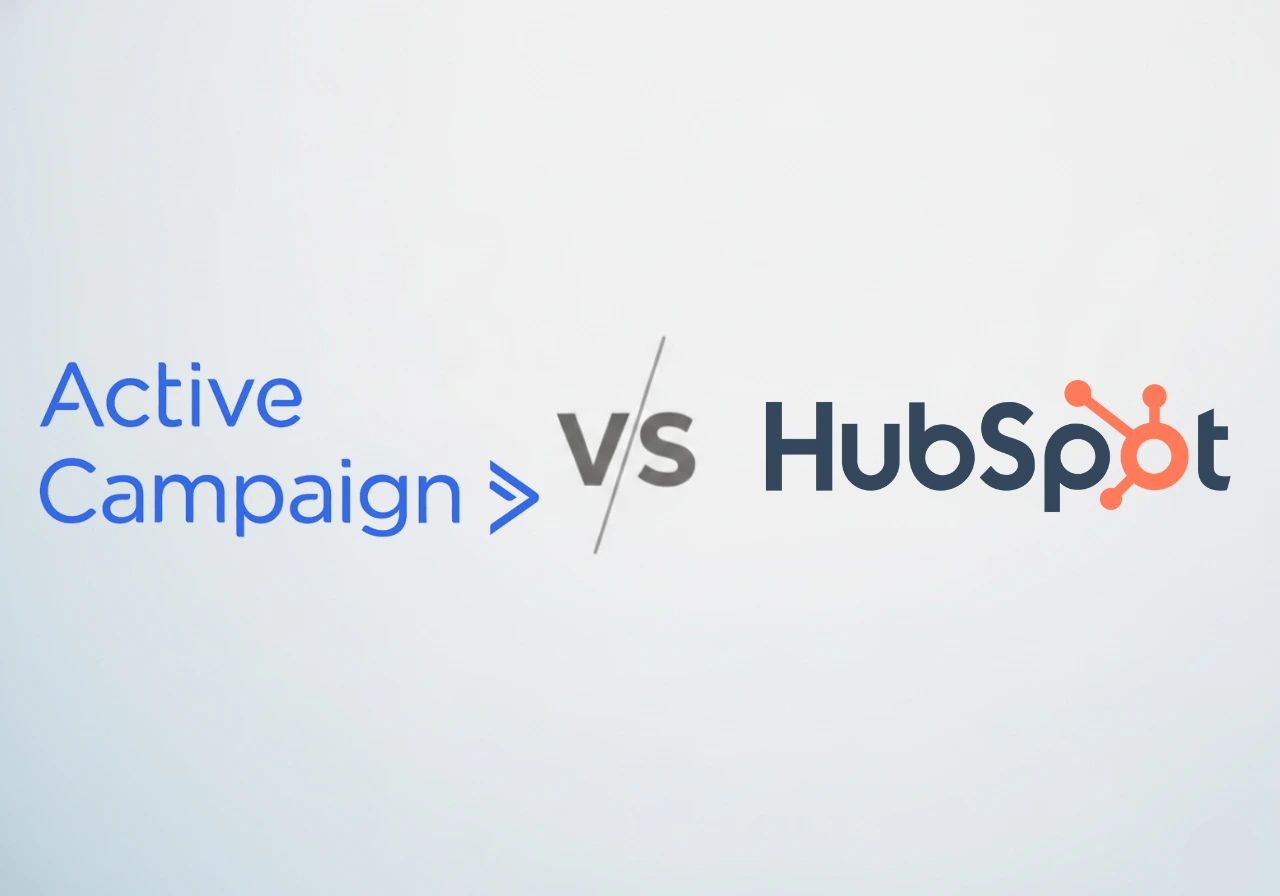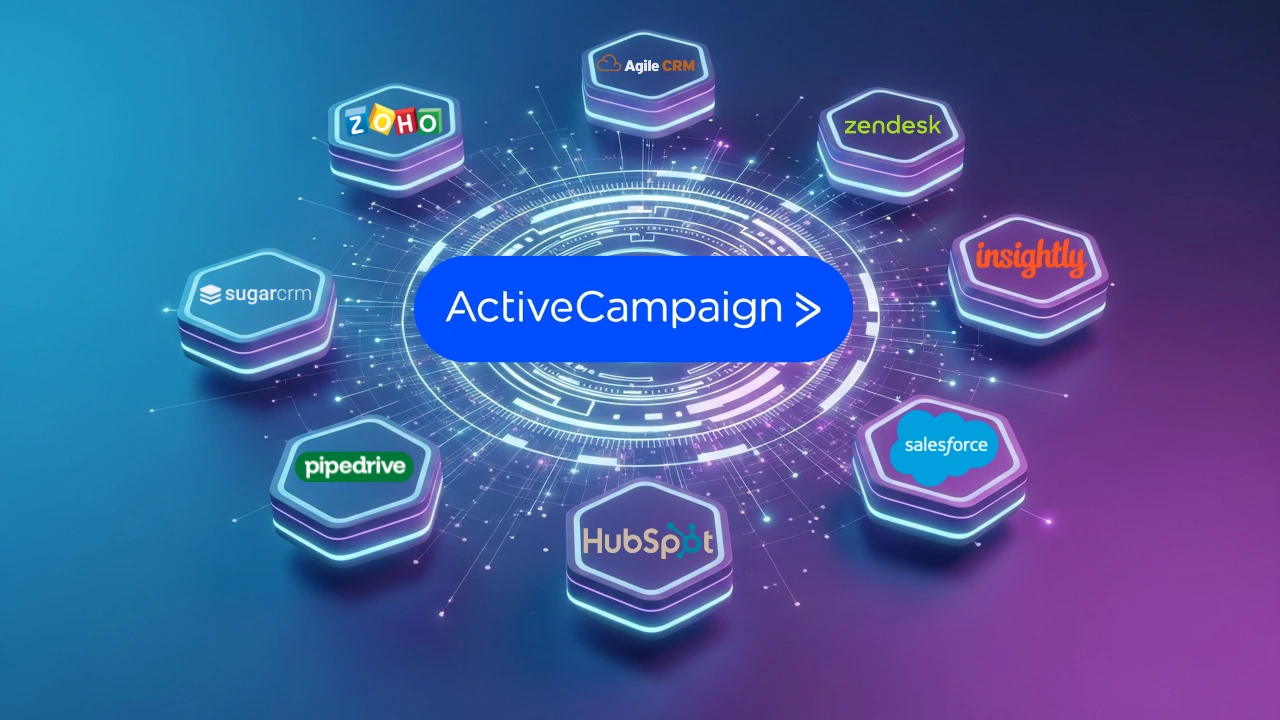•
HubSpot vs Salesforce: The Complete CRM Comparison for Growing Businesses
September 25, 2025
.webp)
Quick Comparison Summary
HubSpot wins for growing businesses that need built-in marketing automation, comprehensive email marketing, and all-in-one capabilities at scale. Salesforce wins for sales teams prioritizing advanced functionality through Sales Cloud & API integrations, extensive customization through Einstein AI, and enterprise-grade pipeline management without marketing complexity.
Still unsure which platform fits your specific needs? Read our detailed comparison below or contact Capital S Consulting for expert CRM selection guidance.
• Who each platform fits: HubSpot serves small to medium-sized businesses requiring integrated sales and marketing operations; Salesforce serves enterprises needing complex sales CRM capabilities with extensive customization options
• Time-to-value insights: HubSpot typically achieves user adoption within days to weeks with an intuitive onboarding process; Salesforce's comprehensive features require weeks to months for full implementation and user training
• TCO considerations: HubSpot's transparent pricing models can increase with contact volume and advanced features; Salesforce's modular approach requires careful planning as costs accumulate through add-on modules, seats, and implementation services

HubSpot positions itself as a unified customer platform that combines traditional CRM software with integrated marketing automation, customer service, and content management. The platform emphasizes multichannel communication while maintaining competitive pricing for growing businesses. What sets HubSpot apart is its comprehensive approach to customer relationship management alongside marketing functionality, offering everything from lead capture, to email marketing, to advanced reporting and analytics in a single solution.
Key Features
Marketing Hub with Sales Hub Integration: Built-in calling and email marketing campaigns, marketing cloud functionality with detailed analytics, eliminating the need for separate marketing automation tools and improving marketing and sales alignment.
AI-Powered sales assistant: Breeze Co-pilot serves as an AI assistant helping with email drafting, sales forecasting, and note-taking to increase productivity and streamline daily sales activities.
Team collaboration: Shared team inboxes functionality, internal notes, and conversation management across multiple channels including live chat, supporting comprehensive client engagement strategies.
Advanced contact management: Extensive field customization, multiple pipeline management creation, and flexible workflow automation that adapts to complex sales processes and lead management requirements.
Built-in communication tools: Native calling, text messaging, and email marketing capabilities integrated directly into the CRM software without additional costs, making it ideal for high-volume outreach.
HubSpot Quick Summary
All-in-one marketing and sales powerhouse | Extensive built-in integrations | Advanced features require paid tiers | Competitive pricing that scales with contacts

Pricing Structure
HubSpot offers integrated pricing across its customer platform with 15-day free trials:
• Starter Customer Platform: $9/user/month (annually) - combines Marketing Hub Starter, Sales Hub Starter, Service Hub Starter, Content Hub Starter
• Professional Plans: Sales Hub Professional $90/month, Marketing Hub Professional $800/month
• Enterprise Plans: Sales Hub Enterprise $150/month, Marketing Hub Enterprise $3,600/month
Enterprise pricing available upon request for larger organizations requiring custom integration options and advanced AI features.
Note: Pricing information verified as of September 2025. Annual billing includes significant discounts compared to monthly plans.
Our Take on HubSpot
HubSpot excels at providing comprehensive communication tools within a unified customer platform, particularly when businesses need built-in calling, text messaging, and marketing automation capabilities integrated with their customer relationship management system. From a CRM implementation perspective, the platform offers exceptional value for organizations wanting to consolidate multiple sales and marketing tools while improving their overall sales performance tracking. However, the interface can feel overwhelming for teams seeking simple pipeline management, and the extensive feature set requires more initial setup time compared to simpler alternatives. For growing companies looking to unify their sales and marketing operations while maintaining cost-effectiveness, this customer platform provides excellent scalability and comprehensive functionality for long-term growth.

Salesforce has earned recognition as a sales-focused platform that prioritizes enterprise-grade functionality without sacrificing customization capabilities. The platform's Einstein AI and newly introduced Agentforce serve as its cornerstone features, allowing teams to leverage Predictive AI and advanced analytics with customizable stages and extensive automation. This approach makes it particularly effective for organizations requiring complex account hierarchies and sophisticated sales forecasting through organized lead management and systematic customer service workflows.
Key Features
Einstein AI and predictive analytics: Advanced AI agents help with sales forecasting, lead conversion optimization, and customer service automation, providing data-driven insights for strategic decision-making.
Sales Cloud excellence: The platform emphasizes comprehensive pipeline management and automated follow-ups for sales reps, ensuring maximum sales efficiency while supporting consistent customer interactions across complex sales cycles.
Advanced customization: Extensive workflow automation capabilities, custom objects creation, validation rules, and flexible data warehouse integration that adapts to specific business requirements and industry compliance needs.
Salesforce AppExchange integration: Access to over 5,000 integrations through AppExchange, including Google Sheets, Microsoft Teams, and specialized tools, plus no-code integrations for seamless data synchronization. Beyond what's available on the AppExchange, partners can integrate a wide variety of other tools into the platform.
Enterprise-grade security: Advanced security policies, team hierarchies management, and compliance capabilities suitable for regulated industries requiring strict data governance and audit trails.
Salesforce Quick Summary
Enterprise customization leader | Complex integration ecosystem | Requires dedicated administration | Higher cost as features scale

Pricing Structure
Salesforce offers modular pricing with 30-day free trials:
• Starter Suite: $25/user/month (up to 10 users) - basic Sales, Marketing, and Service Cloud features
• Enterprise: $175/user/month - core Sales Cloud features with advanced customization
• Unlimited: $350/user/month - full Einstein AI capabilities, advanced forecasting, premier support
• Agentforce 1: $550/user/month - unlimited access to Salesforce features and AI customizations
Additional Marketing Cloud Growth starts at $1,500/organization/month, with advanced editions reaching $3,250/organization/month.
Note: Pricing information verified as of September 2025. Annual contracts required for most plans, with additional implementation and support costs typically ranging $25,000+.
Our Take on Salesforce
Salesforce stands out for its enterprise-grade customization capabilities, robust security features & certifications, and comprehensive sales cloud functionality, particularly when organizations need complex account hierarchies, advanced sales forecasting, and extensive validation rules for regulated industries. From a CRM implementation perspective, we've found that the platform's modular approach allows for precise feature selection, making it excellent for organizations prioritizing specific business requirements over all-in-one simplicity. However, the steep learning curve and need for dedicated administration can overwhelm teams seeking straightforward customer relationship management systems, and implementation complexity often requires ongoing consultant support. For enterprises looking to build highly customized sales processes with advanced reporting and analytics capabilities, this platform delivers unmatched flexibility and supports long-term scalability for complex operations.
Pipeline management
HubSpot's pipeline management emphasizes visual simplicity with drag-and-drop deal stages and intuitive progress tracking. The platform provides multiple pipeline creation capabilities, allowing different sales processes for various business lines. Built-in sales forecasting helps teams predict revenue, while automated deal rotation ensures leads don't fall through cracks. The built-in reporting dashboards offer clear visibility into sales performance metrics and conversion rates.
Salesforce excels in sophisticated pipeline management through its Sales Cloud product, offering advanced deal insights, territory management, and complex sales process automation. The platform provides detailed sales forecasting with Einstein AI predictions, comprehensive opportunity scoring, and advanced reporting tools when customized properly. Teams can create custom sales stages, implement validation rules for deal progression, and leverage predictive analytics for strategic decision-making.
Winner: Salesforce - Superior advanced forecasting capabilities, territory management, and Einstein AI-powered insights provide deeper sales analytics for complex enterprise requirements.
Sales automation and email follow-up
HubSpot offers comprehensive email marketing automation with sequence building, personalized email templates, and detailed open/click tracking. The platform includes native calling capabilities, SMS campaigns, and automated follow-up workflows. Email marketing campaigns integrate seamlessly with lead scoring, while the AI-powered content suggestions help craft personalized outreach messages.
Salesforce provides robust sales automation through workflow automation rules, email templates, and Einstein AI recommendations. The platform offers advanced lead scoring algorithms, automated task assignments, and comprehensive activity logging. However, advanced email marketing requires additional Marketing Cloud subscriptions, increasing overall platform costs.
Winner: HubSpot - Built-in email marketing automation, calling capabilities, and comprehensive communication tools provide better value without additional Marketing Cloud investments.
Communication tools
HubSpot integrates native calling, text messaging, live chat, and team inboxes in a single platform. The conversation management system tracks all customer touchpoints, while shared team inboxes enable collaboration across sales and customer service teams. Built-in meeting scheduling and call recording enhance customer experience throughout the sales cycle.
Salesforce offers basic communication features in core plans, with advanced capabilities requiring additional investments. The platform provides email integration, basic calling through third-party tools, and conversation intelligence in higher tiers. Advanced communication features often need AppExchange apps or separate service subscriptions.
Winner: HubSpot - Comprehensive built-in communication tools eliminate need for third-party services and provide better integrated customer experience.
Lead generation and web forms
HubSpot excels at lead capture with advanced form builders, landing page creation, and website visitor tracking. The platform offers progressive profiling, smart form fields, and detailed form analytics. Marketing automation triggers help nurture leads automatically, while lead scoring identifies high-conversion prospects for sales teams.
Salesforce provides basic web-to-lead functionality with customizable forms and lead routing rules. The platform offers advanced lead management through Sales Cloud, but sophisticated lead generation often requires Marketing Cloud Account Engagement (formerly Pardot) or other marketing automation tools. Often, we've found that customers need to utilize tools like Zapier or n8n to best integrate Salesforce with their other tools.
Winner: HubSpot - Superior built-in lead generation tools, advanced form capabilities, and integrated marketing automation provide comprehensive lead capture solutions.
Customization and integration options
HubSpot offers solid customization through custom properties, objects (Enterprise), and workflow automation. The App Marketplace provides 1,900+ integrations, while the platform supports no-code integrations for common business tools. Professional and Enterprise editions offer bi-directional syncing with Salesforce and other CRM systems.
Salesforce provides extensive customization capabilities through custom objects, fields, validation rules, and complex workflow automation. The AppExchange marketplace offers 5,000+ integrations, while the platform supports deep customization through Apex development. Advanced customization options support complex business requirements and industry-specific needs. However, organizations often find these customizations challenging to execute and look to Salesforce's partner ecosystem to execute.
Winner: Salesforce - Superior customization depth, larger integration ecosystem, and enterprise-grade flexibility provide unmatched platform adaptability.
User interface and learning curve
HubSpot emphasizes user experience with an intuitive interface designed for quick adoption. The onboarding process typically takes days to weeks to get started, with comprehensive training resources and responsive customer support. More complex systems can take weeks to months to fully build out within the platform. The platform balances functionality with ease of use, making it accessible for teams without dedicated CRM administrators.
Salesforce offers a powerful but complex interface requiring significant training investment, particularly for organizations with complex customization in their instance. The platform typically needs weeks to months for full implementation and user adoption. While Trailhead provides extensive learning resources, the steep learning curve often necessitates dedicated administrators or consultant support.
Winner: HubSpot - Superior ease of use, faster onboarding process, and more intuitive interface reduce time-to-value and implementation complexity.
Reporting and analytics
HubSpot provides comprehensive reporting and analytics with customizable dashboards, revenue tracking, and marketing attribution. The platform offers built-in analytics for email campaigns, deal progression, and sales performance metrics. Advanced reporting features help teams understand customer journeys and optimize sales processes.
Salesforce excels in advanced reporting and analytics through customizable dashboards, Einstein Analytics, and sophisticated forecasting capabilities. For organizations with even more complex reporting needs, Salesforce also connects to Tableau, their advanced analytics platform, which has superior data visualization capabilities. The platform provides deep sales insights, predictive analytics, and complex reporting options. Advanced business intelligence capabilities support strategic decision-making for enterprise organizations.
Winner: Salesforce - Advanced Einstein Analytics, superior forecasting capabilities, and deeper business intelligence provide more comprehensive reporting solutions.
Customer service and ticketing
HubSpot offers integrated customer service tools including ticketing, live chat, knowledge base, and conversation routing within the unified customer platform. Service Hub provides comprehensive case management, customer feedback surveys, and service analytics. The platform supports omnichannel customer support without additional service investments.
Salesforce provides enterprise-grade customer service through Service Cloud, offering advanced case management, Agentforce AI agents, and comprehensive customer support automation. The platform excels in complex service workflows, field service management, and customer success tracking for large organizations.
Winner: Salesforce - Advanced Service Cloud capabilities, AI-powered customer service automation, and enterprise-grade support features provide superior customer service management.

Here's how HubSpot performs on major review platforms (as of September 2025):
HubSpot Marketing Hub:
• G2: 4.4/5 based on 12,000+ reviews
• Capterra: 4.5/5 based on 5,800+ reviews
• TrustRadius: 8.7/10 based on verified reviews
HubSpot Sales Hub:
• G2: 4.4/5 based on 10,500+ reviews
• Capterra: 4.5/5 based on 4,000+ reviews
• TrustRadius: 8.8/10 based on verified reviews
User feedback consistently highlights HubSpot's ease of use and integrated marketing capabilities. One G2 reviewer noted: "HubSpot's email marketing and automation features are incredibly intuitive." However, pricing concerns emerge in user reviews: "The pricing structure can become expensive as you grow, especially for advanced features."
HubSpot receives praise for customer support quality and user-friendly interface. A Capterra reviewer stated: "The platform's comprehensive suite of tools makes managing marketing campaigns efficient and effective." Users particularly appreciate the platform's comprehensive approach to customer relationship management and built-in marketing automation capabilities.

Here's how Salesforce performs on major review platforms (as of September 2025):
Salesforce Sales Cloud:
• G2: 4.4/5 based on 18,500+ reviews
• Capterra: 4.4/5 based on 18,000+ reviews
• TrustRadius: 8.5/10 based on verified reviews
Salesforce Marketing Cloud:
• G2: 4.0/5 based on 1,400+ reviews
• Capterra: 4.2/5 based on 1,100+ reviews
• TrustRadius: 7.9/10 based on verified reviews
User feedback consistently highlights Salesforce's customization capabilities and enterprise-grade features. One G2 reviewer noted: "Salesforce provides in-depth sales analytics that equip us with valuable insights to accelerate our sales cycle." However, complexity concerns emerge frequently: "The steep learning curve often requires dedicated administrators."
Salesforce receives recognition for advanced reporting capabilities and scalability. A Capterra reviewer stated: "The level of customization and functionality on the sales side is excellent for enterprise needs." Users particularly appreciate the platform's advanced Sales Cloud capabilities and comprehensive business intelligence features, though implementation complexity remains a common concern.
HubSpot Pros and Cons
Salesforce Pros and Cons
Understanding the implementation complexity differences between these platforms can significantly impact your project timeline and budget. Here are key insights from CRM implementation experience:
Process documentation and user adoption planning
Before implementing either platform, document your current sales processes, customer service workflows, and marketing automation requirements. HubSpot's integrated approach simplifies this process by providing built-in templates for common business processes, while Salesforce's flexibility requires more detailed planning to avoid over-customization. Focus on essential features first, then expand functionality as teams become comfortable with the new system.
Total cost of ownership considerations
Both platforms present different cost structures that extend beyond monthly subscriptions. HubSpot's pricing increases with contact volume and advanced features, making it important to forecast growth accurately. Salesforce's modular approach requires careful evaluation of which Sales Cloud, Marketing Cloud, and Service Cloud components are necessary versus nice-to-have. As user count grows, so does the cost for Salesforce. Factor in implementation services, ongoing administration costs, and potential consultant fees when budgeting for either platform.
Integration planning and data migration
Consider your existing technology stack when choosing between platforms. HubSpot excels at replacing multiple point solutions with its all-in-one approach, potentially simplifying your overall tech stack. Salesforce integrates well with existing enterprise systems but may require more complex data synchronization. Plan for data migration challenges, especially contact information cleanp and duplicate management, regardless of platform choice.
Scalability design and future growth
Design your CRM implementation with future growth in mind. HubSpot's unified customer platform scales well for businesses growing from small to mid-market, while Salesforce provides better support for complex enterprise requirements including multiple business units, advanced reporting needs, and industry-specific compliance. If you require many data sources to enrich your contacts, Salesforce is often the better choice given its superior integration capability. Consider how each platform will accommodate additional users, increased data volume, and evolving business processes as your organization grows.
When evaluating HubSpot vs Salesforce, most organizations focus on feature comparisons without considering the broader strategic implications for their business. The decision deserves expert guidance that considers your complete technology ecosystem, growth trajectory, and long-term business objectives.
Here's the reality: choosing the wrong CRM platform impacts more than just your sales team. It affects marketing automation effectiveness, customer service delivery, and your ability to generate meaningful business intelligence. The wrong choice costs more than money - it impacts team productivity, customer relationships, and business growth for years.
Why expert guidance matters
Every situation is different. Your business model, team dynamics, current processes, existing technology stack, and growth trajectory all influence what approach will deliver the best results. We've seen companies achieve remarkable sales effectiveness by optimizing their current systems, and we've guided others through successful platform transitions that transformed their entire customer experience.
The Capital S Advantage
Whether you're considering HubSpot's all-in-one customer platform approach or Salesforce's enterprise-grade customization capabilities, the implementation approach matters just as much as the platform choice. Our experience with both platforms helps you avoid costly mistakes that come from reactive decisions based solely on feature comparisons.
We focus on long-term success rather than short-term convenience. This means evaluating not just what each platform can do today, but how it will support your business objectives, team productivity, and customer experience as you scale. The right CRM strategy can accelerate your growth and improve customer relationships. The wrong one can set you back for years.
Rather than guessing based on feature lists alone, get professional evaluation that considers your specific requirements, integration needs, and implementation complexity. Sometimes the right optimization strategy delivers better ROI than switching platforms entirely.
Take action now
Don't let CRM selection become a bottleneck to your business growth. The complexity of modern customer relationship management platforms, from HubSpot's marketing automation to Salesforce's Einstein AI capabilities, requires strategic guidance to maximize your investment.
Contact Capital S Consulting for expert CRM selection and implementation guidance that ensures your platform choice supports long-term business success. We'll help you navigate the complexity, avoid common pitfalls, and implement a solution that drives real business results.
Schedule your CRM strategy consultation today.
Pricing verified September 2025, subject to change.






